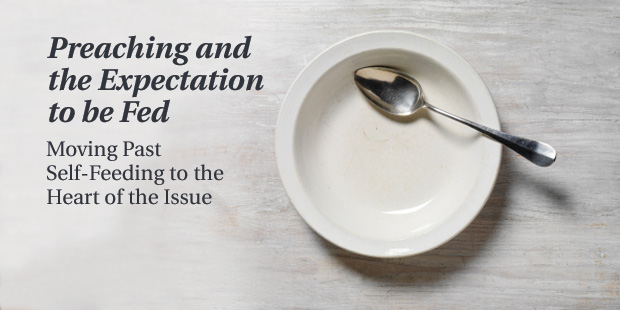
Preaching and the Expectation to be Fed: Moving Past Self-Feeding to the Heart of the Issue
Once upon a time, there was a land filled with banquet halls. Each banquet hall was different, but one thing they all had in common was that the manager of each hall would invite all the people in the area to come to a banquet each weekend.
“Everyone should attend a banquet each week,” the managers would say. “People are starving out there and they don’t even know it. Invite them to our banquet hall so they can be fed.”
Eventually, some people began to abandon banquet halls, not because they didn’t want to eat, but because they discovered other ways to get a good meal.
The managers would say, “There’s so much more to the banquet hall than just the weekend meal, though. It’s not about whether or not you get fed each weekend. It’s about living and eating healthy all the time.”
And then the former banquet goers replied, “If the banquet hall isn’t all about the meal each weekend, why do you only seem to talk about the weekend menu? Why is the whole banquet hall organized around the meal?”
People will expect to be fed as long as we continue to make dinner the main focus.
——-
We have chosen a specific model for “doing church.” Our weekly rhythm, our staffing, our facilities, our communication materials, and our programs all sound a single message: the sermon is what matters most.
We promote our next sermon series as the reason for people to come back or the reason for our regular attenders to invite friends. We place a unique sermon series graphic on the cover of the weekend bulletin and project it onto the large screens in our sanctuaries. We devote more than 50% of our weekend services to the sermon. Many times, the songs we sing are selected because of their connection to the sermon.
And then, we seem surprised when people choose a church based on the quality of the preaching. “People need to feed themselves!” That’s true. They do. But we shouldn’t be surprised that people expect to get something out of the sermon when we structure all of our activities around it. If we don’t expect them to get something out of it … maybe we should stop treating it as the most important thing.
If church is more about fellowship, or serving our community, or growing together spiritually in small groups (“because that’s the best environment for real growth” we say), we should structure our activities around that. Let’s shape everything we do around the thing that’s most important (if it’s not really the sermon). Or, if we think a combination of those things are necessary, then treat them all as necessary, including the sermon.
We can’t let ourselves off the hook by calling people to feed themselves when we’re providing a meal every week. Instead, let’s take the responsibility to make the meal something good, something that satisfies, something meaningful.
No matter what we do, let’s be aware of—and take responsibility for—the model we’ve chosen and everything that goes with it.

Tags: Steve Finkill, Worship, worship leaders











